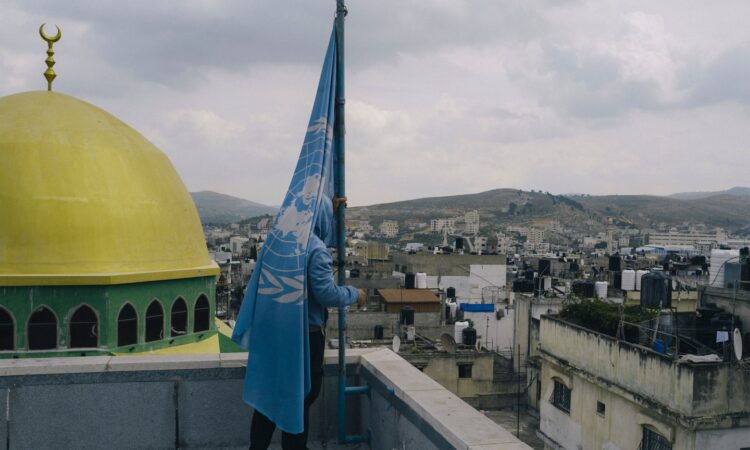
But most of the key countries that paused funding to UNRWA have since reinstated it, citing the acute humanitarian situation and the agency’s new assurances of oversight in its operations.
Part of that reconsideration came after a highly anticipated independent review of the agency published Monday found that Israel had not provided evidence for allegations it also made that a significant number of workers within the agency are tied to militant groups.
Still, some others have maintained their suspensions. That notably includes the United States, by far the largest donor to UNRWA, contributing nearly half the agency’s yearly operating budget.
But, even if the Biden administration wanted to reconsider supporting UNRWA, its hands are tied. Republicans in Congress tacked on a year-long funding ban to a government spending package that passed last month. Even as the war continues, U.S. funding for UNRWA is prohibited by Congress until at least March 2025.
More than 70 governments and several organizations pledged a total of $1.46 billion in donations to UNRWA in 2023, with the largest donors being the United States ($422 million), Germany ($213 million), the European Union ($120 million) and France ($62 million).
The UNRWA program’s annual operational needs are around $850 million annually, UNRWA Communications Director Juliette Touma said. And needs have surged since the war broke out.
On Wednesday, the agency sent out a flash appeal seeking another $1.21 billion in emergency funds to address critical humanitarian needs in the Palestinian territories — one of the highest asks ever made in a “testament to the unprecedented needs on the ground,” Touma said.
“The entire 2.3 million population of the Gaza Strip is in need, on the brink of famine. Most health, water and shelter infrastructure has been flattened or placed out of commission by Israeli military operations and denial of access,” the emergency appeal read.
The funding troubles began on Jan. 26, when the United Nations first announced what it called the “serious allegations” against its staff: Israeli authorities had alleged the involvement of some 12 UNRWA employees in the Oct. 7 attack on Israel. UNRWA fired several staff members and launched an independent investigation.
Later that day, the United States became the first country to suspend funding to UNRWA.
A total of 16 countries announced suspensions: Australia, Austria, Britain, Canada, Estonia, Finland, Germany, Iceland, Italy, Japan, Latvia, Lithuania, the Netherlands, Romania, Sweden and the United States.
Other governments said they would reassess future pledges, including the European Union, a key donor, which said the European Commission “will determine upcoming funding decisions” in light of the investigation’s outcome.
The agency warned that a projected $440 million in near-term funding hung in the balance amid the freezes. This week, UNRWA said it will run out of money at the end of June.
On Monday, the results of the independent review of UNRWA’s procedures were released, finding that the agency has “established and updated a significant number of policies, mechanisms and procedures” to uphold neutrality in recent years but is in need of critical reforms. Catherine Colonna, the former French foreign minister who led the nine-week review, called UNRWA “indispensable and irreplaceable.”
Starting early March and continuing sporadically over weeks, seven countries announced that they would reinstate funding to UNRWA: Australia, Canada, Finland, Germany, Iceland, Japan and Sweden.
Sweden on March 9 said it would disburse about $18.4 million to UNRWA — about half its 2024 UNRWA allocations — after receiving “bilateral confirmation” of increased transparency and tightened procedures within the agency.
Reinstating assistance “is recognition that we need to pursue all avenues to address the suffering in Gaza,” Australian Foreign Minister Penny Wong said in a March 15 statement announcing the resumption of Australian funding under “stringent conditions such as guarantees of staff neutrality.”
Two days after the independent review was released, Germany — UNRWA’s second-largest donor — announced it would also resume financial support, noting that it has “engaged in-depth” with Israel’s allegation. The review’s recommendations must be “implemented without delay,” it added.
Still, several countries have maintained their suspension: Austria, Britain, Estonia, Italy, Latvia, Lithuania, the Netherlands, Romania and the agency’s largest donor, the United States.
State Department spokesperson Matthew Miller, responding on Monday to a reporter’s question on whether the United States acted hastily by suspending funding, said he thinks Washington “acted appropriately.” “We welcome the conclusion of this first investigation. We’ll look to see what the other one produces,” referring to a separate ongoing U.N. oversight investigation into the agency.
“We have always made clear that we think the role that UNRWA plays is indispensable in providing and facilitating the delivery of humanitarian assistance not just in Gaza but in the broader region. We continue to support the work that they do,” he added.






